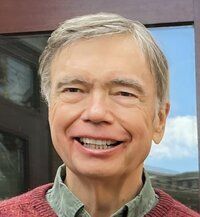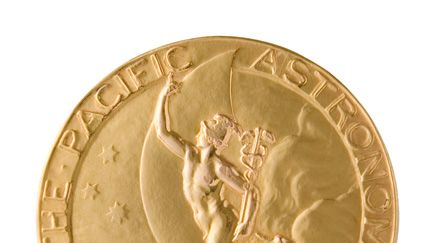Nominations for the 2026 ASP Awards open February 3 through March 31
-
The Catherine Wolfe Bruce Gold Medal will be given in 2026
Dr. Gary Ferland to receive the 2025 Catherine Wolfe Bruce Gold Medal from the Astronomical Society of the Pacific

San Francisco, California - September 10, 2025- The Astronomical Society of the Pacific’s Catherine Wolfe Bruce Gold Medal was established by Catherine Wolfe Bruce, an American philanthropist and patroness of astronomy. The ASP presents the medal annually to a professional astronomer in recognition of a lifetime of outstanding achievement and contributions to astrophysics research. It was first awarded in 1898 to Simon Newcomb. Previous recipients of the Bruce Medal include Giovanni V. Schiaparelli (1902), Edwin Hubble (1938), Fred Hoyle (1970), Vera Rubin (2003), and more recently for her contributions to the James Webb Space Telescope, Marcia Rieke (2023).
The recipient of the 2025 Catherine Wolfe Bruce Gold Medal is Dr. Gary J. Ferland, Professor of Physics and Astronomy at the University of Kentucky in Lexington. Ferland is a leader in the field of quantitative spectroscopy who created the groundbreaking ionization and thermal synthesis code, Cloudy, which has been instrumental in accurately predicting the chemical, physical, and radiative conditions in a wide range of gaseous nebulae, including nova remnants, supernova ejecta, planetary nebulae, molecular clouds, galactic HII regions, and the central regions of active galactic nuclei. Although the initial work on Cloudy began 40 years ago, it continues to be updated and remains a powerful tool in the spectral analysis of gases and plasmas.
Ferland earned his PhD in astronomy from the University of Texas in Austin in 1973 with a doctoral thesis focused on the use of high-resolution spectroscopy to describe the composition, evolving radiation field, and complex motions of its ejecta. As one nominator remarked, Ferland’s thesis was “the most detailed study of a nova up to that time.” From 1978 to 1980, Ferland worked with Bruce Medalists Martin Rees and Andy Fabian at the Institute of Astronomy at Cambridge University, investigating the ultraviolet emissions of radio galaxies revealed by the International Ultraviolet Explorer. It was when Ferland’s work focused on understanding the processes leading to the physical conditions of nebulae and active galaxies that he began creating the simulation codes that eventually lead to Cloudy.
Among his many accomplishments, Ferland’s analysis of the spectroscopic data from UV, visible, and infrared wavelengths collected both on the ground and in space has led to a deep understanding of active galactic nuclei and the gases that surround their central black holes. By successfully modeling the underlying atomic and molecular physics, Ferland has been able to describe the radiation fields, density distribution, abundances, and kinematics of the emitted gases. As one of his nominators pointed out, “These models constitute among the best theoretical specifications of the toroidal geometry of gas being accreted by a central black hole.”
Dr. Ferland has authored 713 refereed publications which have over 40,000 citations. A recent analysis of citations over a twenty-year interval found Ferland received more acknowledgments for contributing to astronomy research than any other scientist. He has received several awards and honors, including the 2016 Albert D. and Elizabeth H. Kirwan Memorial Prize for research from the University of Kentucky. He was elected a Fellow of the American Association for the Advancement of Science and named a Fellow of the American Astronomical Society. In addition, in 2023, Nature Astronomy named Cloudy its first “Code of Honor” in its inaugural Access Code column focused on computer codes widely used in astrophysics.
To ensure that Cloudy remains a relevant tool for research, Dr. Ferland has personally trained and supported the worldwide astronomical community in the use of Cloudy. His Cloudy, Summer and Winter Schools provides training specifically aimed at postgraduate research students and postdocs – providing the next generation of astrophysicists with his mentorship, advice, and support.
Join us in celebration of Dr. Gary Ferland’s achievements at the in-person ASP Awards Gala on Saturday, November 8, 2025 at the Hilton San Francisco Airport Bayfront, Burlingame, CA.
-
Historian of astronomy Joseph S. Tenn has provided a history of the medal, with biographies and links to further information regarding all Bruce Medalists. This information resides on the Sonoma State University website.
Catherine Wolfe Bruce Gold Medal
Awarded since 1898 for a lifetime of outstanding research in astronomy
Established by Catherine Wolfe Bruce, an American philanthropist and patroness of astronomy, our highest award is given annually by the ASP to a professional astronomer in recognition of a lifetime of outstanding achievement and contributions to astrophysics research. The medal has gone to some of the greatest astronomers of the past century and was first awarded in 1898 to Simon Newcomb. Previous recipients of the Bruce Medal include Giovanni V. Schiaparelli (1902), Edwin Hubble (1938), Fred Hoyle (1970), and Vera Rubin (2003).
Please contact our Awards team if you have questions about the nomination process.

